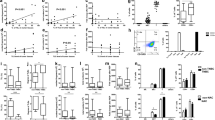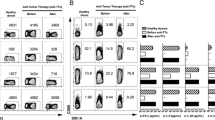Abstract
Background
In this study we activated breast cancer-specific cytotoxic T lymphocytes (CTL) from regional lymph node lymphocytes (RLNL) of HLA-A2-positive patients with breast cancer.
Melthods
Freshly isolated RLNL were stimulated with solid phase anti-CD3 monoclonal antibody followed by expansion with recombinant interleukin-2. Subsequently, the RLNL were stimulated with an irradiated HLA 0201 breast cancer cell line, MCF-7, at a responder/stimulator ratio of 10/1 once a week for 2 weeks.
Results
The cultured RLNL exhibited specific lysis against MCF-7 in all 5 HLA-A2-positive patients tested, but not in 2 HLA-A2-negative patients. Cytotoxicity against MCF-7 was substantially inhibited by addition of anti-HLA-A2 mAb. In 3 of 5 HLA-A2-positive patients, anti-MCF-7 CTL also exhibited a substantial level of reactivity against PC-9, an HLA-A0206-positive lung adenocarcinoma cell line. Conversely, anti-PC-9-specific CTL were inducible by multiple stimulations of RLNL with PC-9 cells in 2 of 3 patients.
Conclusions
These results suggest that several common tumor antigens might exist among HLA-A2-positive breast cancers, some of which may be shared with lung adenocarcinomas.
Similar content being viewed by others
Abbreviations
- CTL:
-
Cytotoxic T lymphocyte
- RLNL:
-
Regional lymph node lymphocyte
References
Mukherji B, MacAlister TJ: Clonal analysis of cytotoxic T cell response against human melanoma.J Exp Med 158:240–245, 1983.
Knuth A, Danowski B, Oettegen HF,et al: T-cell mediated cytotoxicity against autologous malignant melanoma; Analysis with interleukin 2-mediated T-cell cultures.Proc Natl Acad Sci USA 81:3511–3515, 1984.
Herin M, Lemoine C, Weynants P,et al: Production of stable cytolytic T-cell clones directed against autologous human melanoma.Int J Cancer 39:390–396, 1987.
Topalian SL, Solomon D, Rosenberg SA: Tumor-specific cytolysis by lymphocytes infiltrating human melanomas.J Immunol 142:3714–3725, 1989.
Van der Bruggen P, Traversari C, Chomez P,et al: A gene encoding an antigen recognized by cytolytic T lymphocytes on a human melanoma.Science 254: 1643–1647, 1991.
Travesari C, Van der Bruggen P, Luescer IF,et al: A nonapeptide encoded by human gene MAGE-1 is recognized on HLA-A1 by cytolytic T lymphocytes directed against tumor antigen MZ2-E.J Exp Med 176:1453–1457, 1992.
Peoples GE, Goedegebuure PS, Smith R,et al: Breast and ovarian cancer-specific cytotoxic T lymphocytes recognize the same HER2/neu-derived peptide.Proc Natl Acad Sci USA 92:432–436,1995.
Kawakami Y, Eliyahu S, Delgado CH,et al: Identification of a human melanoma antigen recognized by tumor-infiltrating lymphocytes associated within vivo tumor rejection.Proc Natl Acad Sci USA 91:6458–6462, 1994.
Whiteford P, Mallon EA, George WD,et al: Flow cytometric analysis of tumour infiltrating lymphocytes in breast cancer.Br J Cancer 62:971–975, 1990.
Yoshimoto M, Sakamoto, G, Ohashi Y: Time dependency of the influence of prognostic factors on relapse in breast cancer.Cancer 72:2993–3001, 1993.
Baxevanis CN, Dedoussis GVZ, Papadopoulos NG,et al.: Tumor specific cytolysis by tumor infiltrating lymphocytes in breast cancer.Cancer 74:1275–1282, 1994.
Linehan DC, Goedegebuure PS, Peoples GE,et al: Tumor-specific and HLA-A2-restricted cytolysis by tumor-associated lymphocytes in human metastatic breast cancer.J Immunol 155:4486–4491, 1995.
The Japanese Breast Cancer Society: General Rules for Clinical and Pathological Recording of Breast Cancer, 12th ed, Kanehara Co, Tokyo, 1996.
Yoshino I, Takenoyama M, Fujie H,et al: The induction of cytotoxic T lymphocytes agaisnt HLA-A locus-matched lung adenocarcinoma in patients with non-small cell lung cancer.Jpn J Cancer Res 88:743–749, 1997.
Crowley NJ, Slingluff CL, Darrow TL,et al: Generation of human autologous melanoma specific cytotoxic T cell using HLA-A2-matched allogenic melanomas.Cancer Res 50:492–498, 1990.
Saito S, Kurisaka M, Mori K,et al: Induction of specific cytotoxic T lymphocytes against autologous brain tumor by cross reactive allo-tumor cell stimulation.Jpn J Cancer Res 88:289–295, 1997.
Yang S, Darrow TL, Seigier HF: Generation of primary tumor-specific cytotoxic T lymphocytes from autologous and human lymphocyte antigen class I-matched allogenic peripheral blood lymphocytes by B7 gene-modified melanoma cells.Cancer Res 57: 1561–1568, 1997.
Stevens EJ, Jacknin L, Robbins PF,et al: Generation of tumor-specific CTL melanoma patients by using peripheral blood stimulated with allogeneic melanoma tumor cell lines.J Immunol 154:762–771, 1995.
Barnd DL, Lan MS, Metzgar LS,et al: Specific major histocompatibility complex-unrestricted recognition of tumor-associated mucin by human cytotoxic T cells.Proc Natl Acad Sci USA 86:7159–7163, 1988.
Jerome KR, Barnd DL, Bendt KM,et al: Cytotoxic T-lymphocytes derived from patients with breast adenocarcinoma recognized an epitope present on the protein core of a mucin molecule preferentially expressed by malignant cells.Cancer Res 51:2908–2916, 1991.
Akaza T, Imanishi T, Fujiwara K,et al: HLA-A alles and haplotypes of Japanese population.MHC and IRS, Suppl 1: 219–226, 1994.
Author information
Authors and Affiliations
About this article
Cite this article
Eifuku, R., Yoshino, I., Imahayashi, S. et al. Induction of tumor-specific cytotoxic T lymphocytes from regional lymph node lymphocytes of human breast cancer. Breast Cancer 5, 367–373 (1998). https://doi.org/10.1007/BF02967433
Received:
Accepted:
Issue Date:
DOI: https://doi.org/10.1007/BF02967433




